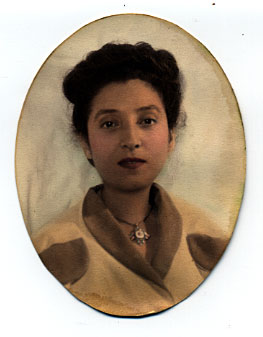It is so interesting how different people deal with their lives, how differently people react to circumstance. In thinking it over, so much seems to be what we are born with, our natural resources, and then, beyond that, the will to make something good (or not) come from that.
I recently met a man in Montreal (a friend of a friend) whose wife had given birth to triplets a little over a year ago (with no chemical interference, an unusual situation in itselfóthe dad was a twin, so that may explain it). He told me that the baby who was the smallest was actually initially the healthiest, didnít need any medical intervention for his survival even though his birth weight was about one and a half pounds while his brothers were almost five pounds. The explanation here was that in the womb he had become accustomed to the struggle for survival, had adapted, so he had a strength that belied his small size.
My friend Raymondís wife has a son who has always found life difficult. He was a troubled child who struggled with himself and others (even though he had a good, loving home) and has only recently, at twenty-six, begun to have any degree of stability in his behavior. On the other hand, Raymond and Lisa had fostered another child when he was nine, a child who came from a very troubled mother (on drugs). This boy was always cheerful and accomplished and even now, at nineteen, is strong and stable, coming through a painful childhood and adolescence with few apparent scars.
My dad once, late in his life, asked me how come things were so different for me than my sister, that everything seemed so much easier for her. I told him we were born different. That itís been noticed that some babies in a nursery startle more easily, cry more, right from birth (that was me!). He agreed we were very different even as babies.
This leads me to think about my aunt Celia, my fatherís sister, who had polio when she was 20, and was paralyzed from the neck down until she died of kidney failure at 45. She lived most of the time in an iron lung, one of those big old round body machines with only her head sticking out. Once, during a storm, the power went out in the hospital where she lived. Before the emergency power had time to be set into motion, she had gasped for enough air to realize that she was able to force air into her lungs in a way that would allow her to be out of the iron lung for what became eight hours at a time. She would go to the theatre, shopping, outings. Someone kindly rigged up some strings that hung down from a bar over her head so that when she blew on one, it would swing into her mouth and when she pulled it, had various responses: one was to turn pages in a book, so she could read (she also read aloud onto tapes for the blind and sold magazine subscriptions to help support herself), one opened and closed the door (her biggest fear was the door closing and no one hearing her if she needed help), another was for a telephone line especially for her, with an operator answering, hello Celia. She said she never wanted anyone to feel sorry for her. She had a good life. The power of will. The power of a clear mind.
